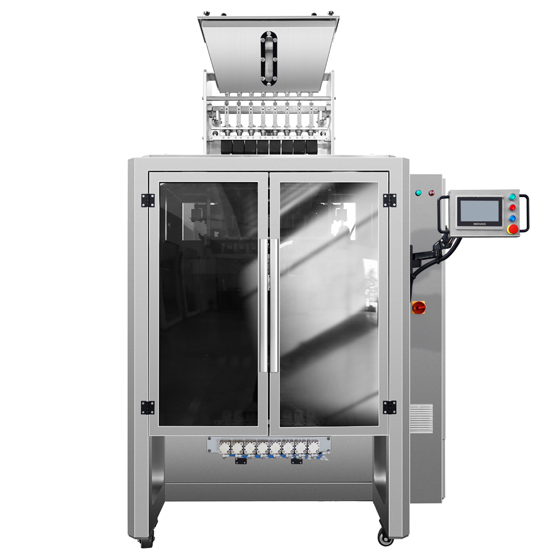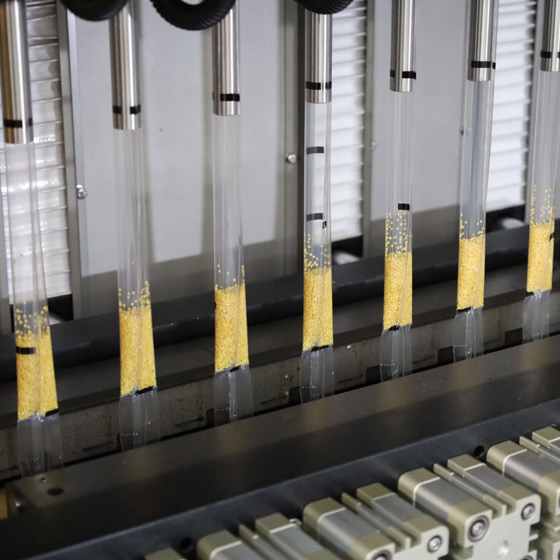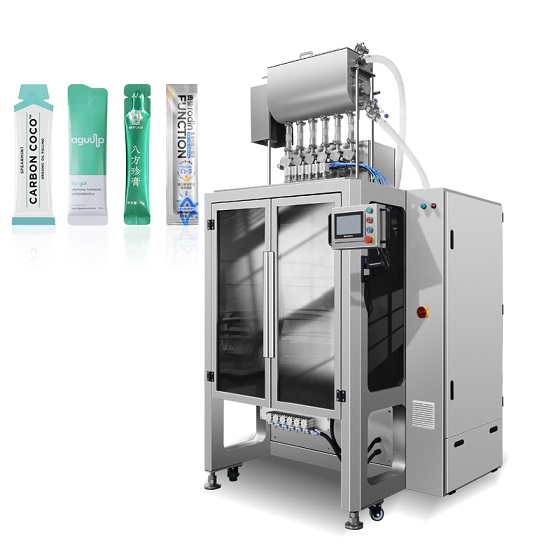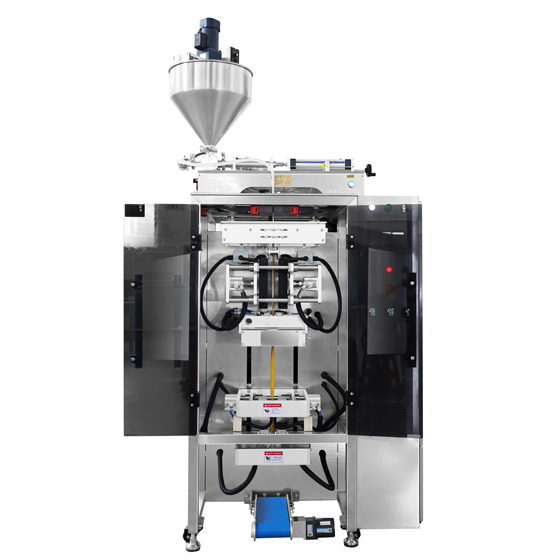Efficiency and reliability are keystones to the unstoppable evolution in packaging. The vertical form fill seal (VFFS) machine stands out as a revolutionary solution, transforming the packaging industry with its speed and precision. This detailed guide is intended to explain in detail how the machines work, their benefits, applications, and how they will shape the future of packaging.
Vertical form fill seal machines are automated systems that have been devised to acquire packaged products efficiently and fast. These machines form, fill, and seal packages in a vertical way and, therefore, are particularly good for various products like powders, granules, liquids, and solids.
VFFS machines form the staple in the packaging industry these days. These machines assist every step associated with the packaging process to be automated, hence much more efficient and uniform. In a continuous single motion, the VFFS machines create a package, fill it with the product, and seal it, which makes the operation smoother and more productive.
The development of VFFS machines goes back to the middle of the 20th century, when increasingly high-speed and more efficient packaging requirements needed to be developed. The basic early models established a simple foundation for today’s sophisticated investment. Over decades, the technological development of speed, precision, and flexibility has shaped these machines into what they have become today.
Everything starts with a roll of film, which a machine unwinds and shapes into a tube. Next, the edges are sealed by the vertical form fill seal machine to create a continuous tube of packaging material. This is one of the most important steps in this process, for it creates the form of the eventual package and ultimately its integrity.
Once the package is formed, this machine is filled with product. The product is dispensed through a filling tube running inside the formed packaging material. A given volume of it can range from as small as one millimeter to as large as several millimeters in diameter, thus producing a fill that is quite accurate and of a repetitive nature. These filling mechanisms may change according to the type of product, such as augur fillers for powders or liquid fillers for fluids.
After filling, the top of the package is sealed by the machine and thus completes the process of packaging. Then, this sealed package is cut and released for distribution. Not only does the sealing process secure the package, but it also makes the package tamper-evident, thus maintaining the integrity of the product.

This refers to the motion that machines make in stopping and subsequently sealing each package. It satisfies the needs of packaging for metered products that are intended for filling and sealing. Typically, what this type of action does is provide greater control over the nature of the packaging process, hence being more befitting for high-value or sensitive products.
Continuous motion VFFS machines produce without an intermittent stop and, hence, operate continually. Thus, they are great for high-speed packaging needs. They offer faster throughput but can be less precise than intermittent machines. Such machines find application in industries where high speed and efficiency are paramount, such as snack food packaging.
These multi-lane VFFS machines are designed to give greater output by producing multiple packages at once. This provides for far higher production capacity, which in turn satisfies huge demand from some industries through effective packaging of items such as sachets or stick packs.
The film unwind system ensures the unbeaten and constant supply of packaging material to the machine. Typically, it involves a motor drive unwind stand that brings about tension and alignment of the film and ensures the operation is with no interruption.
The forming tube shapes the packing material into a tube for subsequent filling and sealing. It is an important component that sets the size and shape of the package, affecting both the appearance and functionality of the final product.
The filling system dispenses the product into the just-formed packaging material and ensures that the filling is accurate and consistent. Options for volumetric fillers, auger fillers, and liquid fillers all depend on the type of product to be filled.
It seals the edges of the packaging material to create a secure and tamper-evident package. This system can use several sealing methods, such as heat sealing or ultrasonic sealing, depending on the material used for the packaging and the product’s requirement.
Finally, the cutting mechanism separates individual packages from the continuous tube. This does a very clean and correct cut. This component can be adjusted for different lengths of package production, thus enhancing the versatility of this VFFS machine.

VFFS machines generally increase the speed of bags produced, hence increasing efficiency and production while decreasing labor costs involved. Such automated packaging can process thousands of packages within an hour, far surpassing manual methods.
The machines can run a wide variety of products, including powders, granules, liquids, and solids, thus versatile for various industries. This reduces the need for multiple types of equipment in packaging, hence streamlining operations.
VFFS machines provide the guarantee of the same level of filling and sealing continuously, thus reducing the waste of products and providing quality packaging. Preciseness in the process maintains the product’s integrity and, consequently, retains brand reputation.
Fully automating the process of packaging, VFFS machines are cost-effective means for business enterprises by reducing labor costs and cutting down on material wastages. An investment in a VFFS can quickly pay off with savings in labor coupled with increased production efficiency.
Food packaging includes snack foods, grains, spices, sauces, amongst others. VFFS machines apply in the food industry by ensuring that packaged foodstuffs are hygienically and efficiently packaged to prolong shelf-life and retain freshness.
The pharmaceutical industry makes use of VFFS machines to package medicines, powders, and other medicinal products, usually accompanied by hygiene and security certification. Dosage, therefore, has to be accurate, with secure sealing also holding out as vital for product safety and efficiency.
VFFS machines, in the chemical industry, are used for packaging fertilizers and pesticides made of chemicals. These machines provide safe, secure, and contamination-free solutions, free from any substance or product contamination, besides proper handling.
The cosmetic industry utilizes VFFS machines for creams, lotions, and other packaging of cosmetic products. These machines ensure that the products are attractively and safely packaged to retain their quality while on the shelf.
Increasingly being used in the pet food industry, VFFS machines are used for packaging dry kibbles, treats, and wet food.

Be certain of the kind of product you intend to package. A different machine is designed for each of the various forms of products, be it powders, liquids, or solids. Ensuring that the machine is tailored towards your kind of product is vital in enabling optimal performance.
Determine the production volume you need to select a machine that fits your speed and efficiency needs. Large-volume operations may want continuous motion or multi-lane VFFS machines while small operations would want intermittent motion machine types.
Be sure the machine is compatible with the type of material you’ll be using, such as plastic, paper, or foil. All these have different ways of handling and styles of sealing, so compatibility is essential to its successful working.
Keep in mind your budget so that you need only the machine that gives you the best value for money. High-end machines sport advanced features and speed while more pocket-friendly options can still yield great performance for smaller operations.
The regular maintenance of the VFFS machines ensures that they are working well. It includes cleaning, lubrication, and inspection of some of its important parts. By scheduling regular maintenance, you will avoid unplanned downtime and prolong the equipment’s lifespan.
Film Jamming: Ensure that the film is aligned and tensioned properly. The wind-off system must be checked regularly for proper adjustments to ensure that nightmare jams are avoided.
Inconsistent Sealing: Check the sealing system for wear and temperature settings. One can ensure the integrity of the seal by regular maintenance and replacement of sealing component parts.
Product Spillage: The filling system can be checked regarding accuracy and correct calibration. Adjust the filling system to ensure consistent and accurate product dosing.
State-of-the-art machines are now supported by advanced control systems that enable them to achieve improved precision and productivity. These include sensors and software that continuously monitor the packaging process and make adjustments to ensure optimum performance.
VFFS machines are being fitted with innovations in sustainable packaging materials and designs that can help reduce their impact on the environment. This shall be achieved through the application of biodegradable films and energy-efficient machine components.
Industry 4.0 technologies, such as IoT and machine learning, are fitted into VFFS machines to enhance their performance and monitoring abilities. This will provide predictive maintenance, real-time monitoring, and improved data analysis for increased efficiency with reduced downtime.
It simply means increasing productivity through reduced manual workforce resources in conjunction with an increase in speed regarding packaging. The automated systems are capable of running continuously to provide constant output and match up to high production demands.
Automated systems provide uniform quality and lessen the chances of human error in the packaging process. This uniformity is crucial in maintaining standards of the product and complying with government regulations.
Automation improves workplace safety because fewer workers will be needed to manually handle heavy or dangerous materials. Automated systems will assist the more hazardous jobs and ensure the workers aren’t predisposed to injury.

QR codes and RFID tags, which involve smart packaging technologies, are being integrated into VFFS machines for increased tractability and consumer drives. Such technologies provide important information about the product and its journey from production to the consumer.
Future VFFS machines will be flexible and customized to meet diversified market demand across many industries. In this case, there will be easier changeover between the different formats and products with reduced downtime, hence increased efficiency.
It is consummate with a focus on sustainability, which drives innovation in eco-friendly packaging material and designs of energy-efficient machines. Key long-term trends drive companies’ search for more sustainable alternative formats and improved solutions for existing formats that will reduce environmental impact. The role of VFFS machines changed in reaction to these demands from the packaging industry.
Vertical form fill seal machines are doing great in the field of packaging with much speed, versatility, and precision. By understanding the process of their operation, the benefits, and areas of application, businesses can make quality decisions that can help optimize their corporate packaging processes. In view of ever-improving technological advancement, VFFS machines are to become an important part of meeting the demands of modern packaging.
Relevant Recommendation